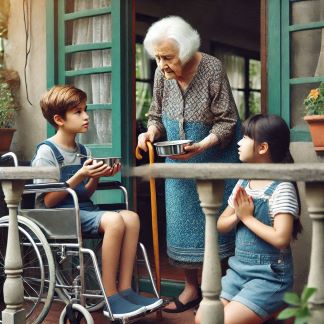Our Care-Dependent Relatives: Our Responsibility
When evaluating the needs of these vulnerable individuals,
let wisdom and empathy guide your perspective, rather than just focusing on being overly realistic or factual.
Care-dependent individuals are those who require assistance with daily tasks due to health or financial limitations.
This group encompasses the elderly, people living with disabilities, and orphans, who often rely on others for support.
For these individuals, loved ones—family members, in particular—play a vital role in providing a sense of hope, belonging, and love.
However, feelings of abandonment by those closest to them can evoke intense loneliness and disconnection from the world around them.
Our Care-Dependent Relatives: Our Responsibility
Neglect of care-dependent individuals can have severe and far-reaching consequences,
including physical injuries, premature mortality, depression, and financial and social repercussions.
The World Health Organization notes that some countries have seen their health sector take the lead in raising awareness about care-dependent individual neglect,
while others have relied on their social welfare sector.
Nevertheless, there remains a significant knowledge gap globally, particularly in developing countries,
regarding the abuse and neglect of care-dependent individuals and effective strategies for prevention.
Recently, two cases caught my attention,
one of which highlighted a disturbing phenomenon: the abandonment of children born with disabilities by their parents at hospitals.
This alarming trend stems from parents’ fear of being stigmatized for caring for a child with disabilities.
Some worry about societal judgements and the potential mockery they may face when taking their children out.
Others, driven by a desire for freedom and an uncomplicated life, feel overwhelmed by the responsibilities that come with caring for a child with disabilities.
This heartbreaking abandonment isn’t limited to children;
adults with disabilities also face rejection by loved ones, who are often overwhelmed by the responsibilities of caregiving.
As a result, many are forced to resort to begging for alms,
while others are exploited by unscrupulous individuals who use them for their own gain, further perpetuating their vulnerability.
Orphans are equally vulnerable to exploitation.
Neglected by parents or loved ones, they become easy prey for opportunists who capitalize on their situation to garner public sympathy and raise funds for personal gain.
Sadly, establishing orphanage homes has become a lucrative business venture in many countries,
rather than a genuine endeavour to provide care and support.
These issues are not mere speculation; they are harsh realities that surround us, yet often go unaddressed and underreported.
The second case that caught my attention was that of an elderly woman who had been abandoned in a hospital for an extended period.
When the doctor asked her, “Don’t you have children?” she replied, “I do, but they are busy.”
Her heartbreaking response serves as a sobering reminder of how, in our increasingly demanding world, many of us have neglected our fundamental human responsibilities,
often prioritizing personal pursuits over family obligations.
Months later, despite the best efforts of the medical team, the elderly woman passed away.
In a tragic testament to the estrangement, none of her children visited her during her hospitalization,
nor were they even aware that she had been rushed to the hospital, due to the vast geographical distance that separated them.
According to the doctor, the elderly woman had confided in him before her passing that she had six children,
all of whom were scattered across various urban cities in Nigeria, struggling to make a living.
Meanwhile, their mother had been living alone in the village.
The brief visits during festive periods were the only times these children would see their mother.
Sadly, this is a familiar pattern for many grown children today,
who only make time for their parents or loved ones in the village or at home during holidays like Christmas.
After the festivities, they promptly return to their frenetic lifestyles, leaving behind care-dependent loved ones to face the rest of the year alone.
Our Care-Dependent Relatives: Our Responsibility
The timing of this publication is particularly pertinent, as we’ve just emerged from the 2024 festive season and are now fully immersed in our daily routines.
As we settle into the new year, a critical question arises:
what support systems do we have in place to maintain close relationships with our care-dependent loved ones amidst our busy lives?
Upon learning of their mother’s passing, the six children were consumed by confusion and shock.
They were unaware of how she had ended up in the hospital, let alone the circumstances surrounding her death.
The doctor, with a mix of disappointment and concern, rebuked them for their ignorance about their mother’s well-being,
emphasizing that she had desperately needed their care and attention during her final days.
Overcome with emotion, tears welled up in their eyes.
The story sparked widespread condemnation of the children’s neglect,
but surprisingly, some people came to their defence.
They argued that the demands of modern life can be overwhelming,
and the children’s failure to check on their mother might not have been intentional.
These defenders also pointed out that the mother may have understood her children’s busy lives,
as evidenced by her own admission that they were “busy” when asked about their whereabouts.
Others used the story as a teachable moment,
emphasizing the importance of parents planning for their own old age rather than relying solely on their children for care.
They noted that children, too, have their own lives to live and responsibilities to attend to
and that parents should take proactive steps to ensure their own well-being in their golden years.
While the criticisms may hold some truth,
the reality remains that we cannot shirk our responsibilities towards our care-dependent loved ones, regardless of our busy schedules.
They are entitled to our attention and care, and it is our duty to provide it.
Our Care-Dependent Relatives: Our Responsibility
Our increasingly busy lives have led us to justify neglecting those who depend on us,
but this justification is, in itself, a troubling issue that demands our attention and correction.
Life is unpredictable, and its twists and turns can affect anyone, including ourselves.
We make plans for the future, but it only takes grace to see those plans come to fruition.
Many individuals, such as the elderly, people with disabilities,
and orphans, find themselves in need of care through no choice of their own.
If given the choice, many elderly individuals would have loved to remain forever young and vibrant, actively engaged in activities.
However, nature’s course cannot be altered, despite instances of elderly individuals who remain remarkably fit and healthy in old age.
Genetic factors play a role, but ultimately, no one can defy the natural ageing process.
Regardless of one’s health, growing old inevitably brings a need for familial attention and connection, lest one feels isolated and alone.
The same principle applies to individuals living with disabilities.
If given the chance to design their own lives, it’s unlikely they would have chosen their current circumstances.
Yet, due to a combination of factors, including genetics and life’s unpredictability, they find themselves navigating unique challenges.
While we may not be able to alter their physical reality, except through miracles,
our love, care, and, attention as their family and loved ones could mean a lot more to them than the physical miracle they seek.
Similarly, orphans did not choose their circumstances.
Life unfolded in ways beyond their control – perhaps they were abandoned by parents unwilling to accept responsibility,
or they lost their parents to the cruel hand of death.
Where, then, are their extended family members or those who were once close to their parents?
For these children, life has taken a devastating turn, one that they cannot even begin to explain.
Ultimately, the care and well-being of our care-dependent loved ones are our responsibility.
Despite our busy lives, it’s essential that we make time for them.
By striking a balance between our various priorities, we can ensure that they feel seen, supported, and not abandoned in their vulnerable state.
Even when distance separates us, a regular and consistent communication routine can bring immense joy to our care-dependent loved ones.
Additionally, it’s crucial to maintain close ties with their neighbours to ensure their safety and well-being.
After all, our neighbours can often serve as a second family, providing a supportive and watchful presence for them in our absence.
Our Care-Dependent Relatives: Our Responsibility
In conclusion, to those who justify neglecting care-dependent individuals due to their busy lives,
remember that you can only do so because you haven’t walked in their shoes.
We pray you never experience the challenges they face.
When evaluating the needs of these vulnerable individuals,
let wisdom and empathy guide your perspective, rather than just focusing on being overly realistic or factual.
Also Read: Beyond Eye Service: When Motive Matters – Diademng
Our Care-Dependent Relatives: Our Responsibility
















Noodlemagazine I do not even understand how I ended up here, but I assumed this publish used to be great